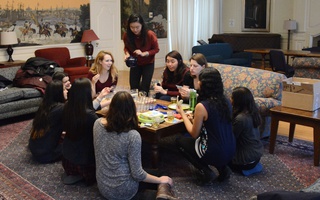“Men are taught to apologize for their weaknesses, women for their strengths.”
For centuries now, society has conflated sex with gender, creating a hierarchy among the sexes. Lois Wyse’s words above show this phenomenon to be true: From a young age, boys are disciplined to present themselves as stoic, while girls are instructed to portray themselves as emotional. Because of the association between emotionlessness and strength, and sensitivity and weakness, society hierarchically places men above women. Men are associated with strength, and women with weakness.
The commonplace assumption that stereotypically masculine traits are mutually exclusive with characteristically feminine ones breeds this type of thinking. However, when gender is placed on a spectrum, it becomes possible for a myriad of traits to overlap and coexist within one body, without some being superior to others. Considering gender on a spectrum allows people to be human.
No person perfectly matches either of the two extremes of the gender spectrum—men are innately emotional beings and women are intrinsically strong ones. People exist somewhere in the nebulous space between the two endpoints of the spectrum, regardless of their sex assigned at birth.
How we think about gender is important because gender directly relates to the systems that surround us—politics, economics, culture. Therefore, when values of superiority and inferiority become assigned to different genders, these sentiments manifest themselves in other spheres of society too.
It is because of this longtime worldwide tradition of discrimination against women that we need International Women’s Day, which began in the 1900s as a call for women’s equality.
Today’s world still witnesses the systematic discriminatory practices erected throughout history with the sole purpose of subjugating women to a status of inferiority. Centuries of unchecked compartmentalization of gender into two polarized categories birthed and institutionalized the superiority of males over females. Inequitable pay, lack of governmental representation, sexual assault, and underrepresentation in the educational and professional spheres carry the influence of the sexist patriarchy with them.
Despite all the false perceptions of gender and opposition to gender parity, women have overcome. Throughout history, women have proven, against all odds, to be resilient. From the dedicated work of Malala Yousafzai in securing equal access to education to the efforts of Susan B. Anthony to get women the right to vote, countless women have left footprints that can’t be erased, no matter how male-dominated our society is.
While International Women’s Day is a spectacular way to celebrate those who have enacted change, it is important to not forget that transgender women are just as woman as ciswomen.
We praise Rosa Parks, Marie Curie, and Frida Kahlo for their lasting influence, and we should continue to do so. But what about Marsha P. Johnson and her pioneering advocacy within the BGLTQ community? Do we sing her name in conjunction with her cis sisters, or is her story forgotten because of her transgender identity? We cannot erase trans bodies from their contributions to society because of the innate intersectionality—the ability for multiple social constructs to apply to one individual—of the female identity: it encompasses, race, sexuality, class.
Being a cisgender male in today’s world is a privilege, but it should not be. Gender—male, female, nonbinary, transgender—should not define a person’s worth. Sadly, the institutions established throughout our history do not reflect this seemingly basic fact. I am privileged by my identity and do not need to face the obstacles women must face every day. That does not mean, however, that I will stand by idly and watch half of the world’s population suffer at the hands of sexism and misogyny. As long as practices that discriminate on the basis of gender exist, we are all at risk.
I am proud to call myself a feminist. I am proud to stand in solidarity with women. I am not in the fight to give women strength—for they already possess that. Rather, I am in the fight with women and men around the world to help tear down the institutions that prevent women from being allowed to exercise their personhood to its fullest extent. I am in the fight to enact and normalize the equality women deserve, rather than the status the patriarchy has attributed to them. We have already seen what women can do with immense barriers in front of them. Imagine what they can do without them. The future is not in preserving the male-centric society that exists. The future is female.
Elijah T. Ezeki-Okoye ’20 is an Crimson Editorial writer living in Wigglesworth Hall.
Read more in Opinion
To Flannel or Not to Flannel?Recommended Articles
-
Scientific ProgressA study commissioned by the president of Princeton University, Shirley M. Tilghman, has found that female faculty members in the
-
All the Men PresidentsRecent discourse regarding gender issues on the Harvard campus has centered upon issues of women in science, female tenured faculty,
-
Harvard Reaches Gender Parity in Junior Faculty HiresHarvard’s total number of junior faculty hires has reached gender parity across the University for the first time ever.
-
 15 Minutes with Ellen Fitzpatrick
15 Minutes with Ellen Fitzpatrick -
 Decoding Harvard’s Computer Science Gender Gap
Decoding Harvard’s Computer Science Gender Gap













